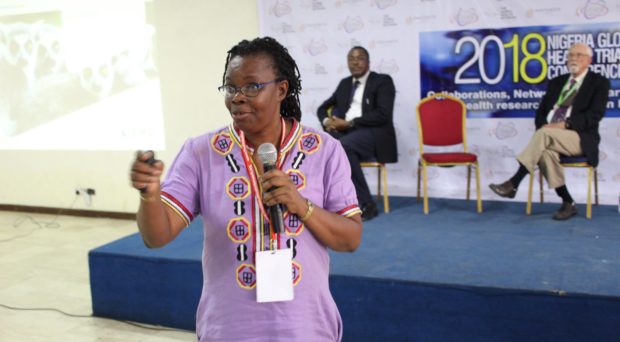
The 2018 Global Health Trials Conference attracted over 350 registered participants and over 25 national and international speakers and facilitators. This year’s theme was ‘Collaborations, Networks and Partnerships for Health Research Conduct in Nigeria’. Topics discussed cut across multiple global health issues ranging from infectious diseases, communicable and non-communicable diseases, to education in global health and scientific communication.
The keynote speaker, Prof Akin Abayomi, emphasized the need to harness local resources to fund research that prioritizes the needs of countries in Africa. He highlighted how slave trade, colonialism, neocolonialism and corruption had robbed the continent of its potential for growth and development; and how efforts needed to be invested in preventing Africa being left behind in the era of knowledge and technology development.
Themes that emerged from the two days meeting included motivation of participants to disrupt the current norm of practice to be able to make advances with global health research. This includes questioning the convention, making choices to do things differently and thinking without the box. Such approaches make it possible for researchers in low and middle income setting to maximize possible outcomes from the collaborations with Northern based researchers offer, improves the potential values of South-South Collaborations, and pushes the frontiers of medical and global health education.
At the meeting, I shared with participants the publishing opportunities BMC Series offers to research scholars from low and middle income countries. These include efforts to promote interesting stories. For instance a study in BMC Public Health – “Socially isolated individuals are more prone to have newly diagnosed and prevalent type 2 diabetes mellitus – the Maastricht study.” published in December 2017 has already featured on 130 news outlets worldwide.
I shared my experience with handling of manuscripts as a section editor with the BMC Oral Health. I took participants at the workshop through the BMC peer review process reiterating that BMC focuses on publishing good quality research and not just innovative research. I highlighted that accepted research manuscript must ask a scientifically valid research question which should fill a gap in the existing knowledge, and be informed by previous research or clinical observations. The research must also use suitable data collection and data analysis methods.
Prof William Brown, Prof Emeritus, University of Colorado School of Medicine, USA, complemented my talk by educating participants on critical considerations when determining the title of the manuscript, writing the introduction, methods, results, discussion, conclusion and abstracts of a manuscript. His talk focused on helping non-native English writers avoid various pitfalls when writing a scientific paper.
It was nice to find out that lots of participants at the meeting were familiar with BMC. The greatest concern they had was the high article processing fee for researchers in low income countries with little or no access to research grants. I highlighted that the BMC is sensitive to this need and provides researchers with fee paying options which includes complete fee waiver when there is a justification made for such waiver. Inability to pay article processing fees is not a deterrent for publication of good quality manuscript at BMC.
Comments